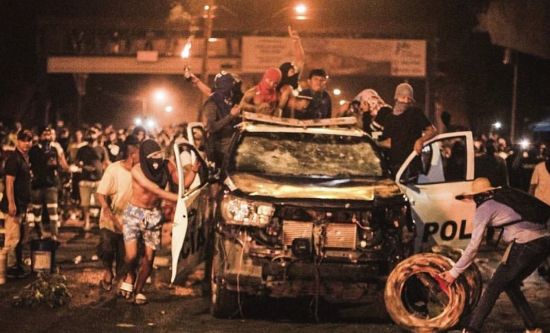
On 25 July, after five days of negotiations, Panama’s government finally agreed a 30% reduction in the price of 72 essential food items. This was a key demand by the social movements, unions and indigenous groups whose more than two weeks of protests had brought much of the economic life of the country to a halt. Negotiations over the movement’s other demands continue.
The mass protests over poverty and soaring prices began on 6 July, when teachers in the central region of Veraguas went on strike. This became a national teachers’ strike, and they were soon joined by organisations of rural and indigenous workers, students and other unions including SUNTRACS, the radical and powerful construction workers’ union. In the biggest mobilisation in years in the central American country, protests took place in every province and roads to the capital Panama City were blockaded with burning tyres. The Pan-American Highway which links the vital Panama Canal to Costa Rica and the rest of central America was blocked. Food trucks were unable to leave the main agricultural province of Chiriqui, which supplies the capital. The protests are increasingly being coordinated by two coalitions, the United People for Life Alliance and the National Alliance for the Rights of the Organised People (ANADEPO).
Their demands include:
- a reduction in the price of fuel, medicines and basic commodities;
- a general increase in salaries and pensions;
- an increased budget for public education and healthcare sectors and better working conditions in those sectors;
- the repair of hospitals, roads, and other public infrastructure;
- measures to combat corruption;
- a rejection of the four US military bases in the country;
- policies to support the indigenous communities and protect their autonomy;
- withdrawal of austerity measures introduced in May including a 10% reduction in the public sector workforce.
The movements have proved resolute against attempts by President Laurentino Cortizo to involve the private sector in the negotiations, which are being mediated by the Catholic Church. They rejected out of hand attempts early on in the protest for just a minor reduction in food costs on a few basic items, holding out for a capping of the full ‘monthly food basket’.
These protests are the latest manifestation of the impact rising prices are having on the world’s poor. Despite its much-trumpeted economic growth of 6.5% this year, inflation in Panama is at 5.2%, more than half of workers are employed in the informal economy and the official unemployment rate is 10%. The country has the second worst income distribution in Latin America. The richest 20% control more than half of the country’s wealth. The billions of dollars’ worth of international trade that pass through the Panama Canal (directly controlled by the United States until 1999) bring wealth only to an urban and banking elite. As befits a country which is a major tax haven (something that came to particular prominence through the revelations of the Pandora and Panama Papers) corruption is rife. But poverty in rural areas is endemic, with 86% of the indigenous population living in extreme poverty. For example, among the Ngabe Bugle people, Panama’s largest indigenous group, more than half of all children suffer from malnutrition and illiteracy is rife. The Covid-19 pandemic has made the situation much worse – the economy contracted by 18% in 2020, one of the worst recessions in Latin America. There is a growing hunger for social and economic change. In the words of the SUNTRACS leader, Saul Mendez, ‘The accumulated problems are the result of a neoliberal model imposed by the economic elites and seven successive governments of traditional parties that profit from the destitution of the people’.
Cassandra Howarth




